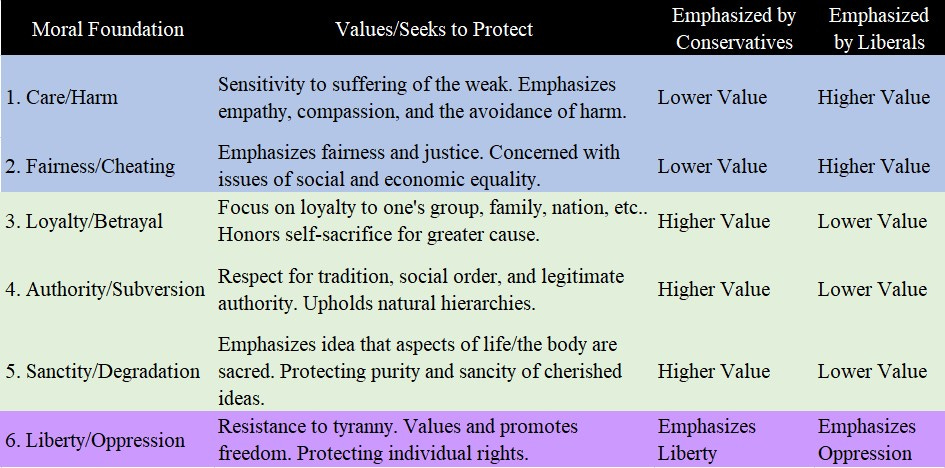Yarvin, Rufo, and Endless Factual Sediment
Facts are not prescriptive, narratives are. Let's systematize a political debate.
This is a prelude to the Biofoundationalism series of essays that I’ll be publishing here soon.
There was a debate between
and recently. It was entertaining and a fun read, though I didn’t think it was particularly useful. Mostly because I think good exchanges should be productive. That isn’t to say it was uniquely unproductive, just garden-variety political-dialogue wheel spinning. An inference from these statements is that I find most political discourse to be less than useful; this inference would be accurate.This exchange perfectly exemplifies the futility of political discourse. Both men are verbally adroit, so we got a lot of clever dunks and witticisms. And they both masterfully curated sets of facts that concocted narratives for conclusions they long ago decided were true. Political debates can almost entirely be summarized as competing moral frameworks talking past each other.
Here’s the TL;DR of the debate, from the lens of a radical systematizer:
"Wow, you actually were unaware of this FACT? Also you failed to mention this FACT and another FACT that undermines your whole world view. Read a book!"
"Aha foolish you are for completely ignoring these little-known FACTS over here. Which when viewed in conjunction with this FACT, shows you to be nothing more than a chimp in shoes!"
Intelligent people with high verbal IQs are more adept at obfuscating their moral imperatives with carefully arranged facts that craft their narratives. This makes their conclusions seem more correct or informed to the uninitiated. Politically “educated” simply means an expert recall of factoids that make a narrative appear superior.
There are many facts. Endless facts even. Which ones do you emphasize? Only the good and true ones? Ah, don’t we all…
The articulate often dominate political domains because they’re the most compelling advocates of their moral foundations, and attract support from those with similar temperaments as a result.
This debate is what happens when you put two different temperaments with high verbal IQs in a room. You get a lot of spectacle and little true systematizing focused on problems and their eradication. Just endless FACT dunking about whose reading of history is wrong (to his credit, Yarvin does systematize some things).
Facts are tools, they are not prescriptive. Narratives are prescriptive. Facts are used to form narratives, and narratives are in service of moral foundations.
Moral foundations are a product of temperament, and temperaments are biologically imposed.
Here are the moral foundations that act as the substrate of all political thought. The ones you prioritize are a result of your temperament. Your temperament is a result of biochemistry and brain activity; which is to say, you’re born with it.
(Subsequent posts will elaborate on this biological claim and the moral foundations framework more thoroughly. This is the essence of the Biofoundationalism essays.)
Intelligent people have a lot of factual sediment to wade through to get to what they're actually advocating for: their moral foundations, masquerading as political policy.
An Analysis of Yarvin’s and Rufo’s Moral Foundations:
Curtis Yarvin scores very high on Authority/Subversion
Yarvin is a monarchist. He views rigid, absolute authority as the only path to rectify structural issues. Almost all of his work is centered around placing utmost emphasis on this moral foundation, and he's magnificently well-read in his promotion of it. How do you think he came to be so singularly focused on this moral foundation? Must have been all the books...
—
Chris Rufo emphasizes Sanctity/Degradation, with secondary focus on Fairness/Cheating
Rufo's hyperfocus is on DEI: which undermines values he holds sacred regarding merit and notions of fair treatment. Leftist race communism compromises these things, so he believes eradicating it is paramount. He sees the continued degradation of these sacred ideals as a core culprit for US decline.
Why is it useful to deconstruct political dialogue in this way?
So you can understand:
Why does this guy keep focusing on certain FACTS and not others? What narrative is being created here?
Why is he constructing this narrative and what does it promote?
To ascertain which moral framework is dominant for each party. Then try to figure out which one has greater utility in the current environment.
All of the aforementioned moral foundations have utility, but some have more than others depending on the political climate. I will review this in upcoming essays.
I have Yarvin sympathies due to a "fix the actual problem and stop with the surrogate activities" mentality. I think Rufo is excellent, but that his actions will produce pyrrhic, symbolic victories. However I believe I'm telling you more about my temperament than anything else with these observations.
To see what I think true political systematizing looks like, and where this unusual analysis comes from, you may enjoy the upcoming series of essays I will be publishing here that I call Biofoundationalism.
Other writings related to my emphasis on temperaments: Astrology, Darwinian Truths, and Biochemistry in the Womb
Like and share. Follow BackTheBunny







Facts describe our current state. Evidenced theories describe how actions affect the current state. Values determine which outcomes we should prioritise or care about.
A good policy requires clarity on all three.
"Facts are tools, they are not prescriptive. Narratives are prescriptive. Facts are used to form narratives, and narratives are in service of moral foundations."
Love this. This is what I was getting at in this essay as well: https://drmonzo.substack.com/p/reckoning-with-truth-and-myth